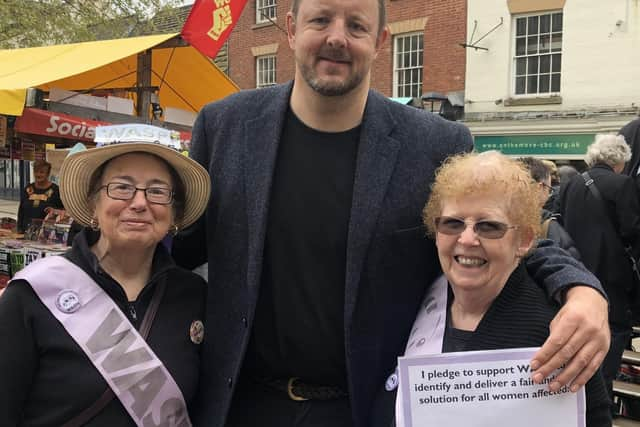Derbyshire chief of WASPI campaign hails significant victory after legal action in battle for pension compensation for 1950s-born women
and live on Freeview channel 276
The Women Against State Pension Inequality (WASPI) group launched a judicial review in the High Court earlier this year – raising £120,000 from thousands of affected women – to challenge a Parliamentary and Health Service Ombudsman (PHSO) report.
In the first stage of its investigation into the Department for Work and Pensions’ communication of State Pension age changes, the Ombudsman concluded that DWP had committed maladministration by failing to write promptly to the 3.6million affected women.
Advertisement
Hide AdAdvertisement
Hide AdHis July 2021 report found that 1950s-born women should have had “at least” 28 months’ more individual notice of the changes. “For women who were not aware of the changes, the opportunity that additional notice would have given them to adjust their retirement plans was lost,” he concluded.


But in a so far unpublished second stage report, the Ombudsman went on to make what he now concedes was a ‘legally flawed’ calculation about the impact that maladministration had.
The Ombudsman had decided to assess the injustice suffered by WASPI women on the premise that each woman affected would have received a letter exactly 28 months earlier than they did.
WASPI challenged this approach in court, showing that counting 28 months backwards from the dates on which women received a letter failed to take account of three periods during which the DWP had paused its already belated direct mail campaign.
Advertisement
Hide AdAdvertisement
Hide AdThe flawed calculation meant that in the case of one sample complainant, Mrs W – whose case the Ombudsman has examined – the Omudsman assumed she would still have received her letter as late as March 2011 even if DWP had communicated State Pension age changes properly.
By contrast, lawyers acting for the affected women successfully argued that had DWP started its direct mail programme when it should have – and sent the letters out without ‘pauses’ – Mrs W would have received notice of the delay to her State Pension some two years earlier, in June 2009.
Had Mrs W received her letter when she should have, WASPI argues that she – and millions of other women in a similar position – would have taken different ‘life-changing’ decisions about their work and retirement plans.
In an unprecedented move, the Ombudsman has now accepted its approach to calculating injustice ”failed sufficiently to consider the potential effect of the pause periods and was legally flawed for that reason.” It is the first time the PHSO has settled a judicial review claim out of court.
Advertisement
Hide AdAdvertisement
Hide AdAn order submitted to the High Court for approval will now see crucial parts of the Ombudsman’s Stage 2 report quashed and reconsidered. His draft Stage 3 report – which describes the level of compensation women should get – will also be rewritten.
WASPI chair Angela Madden, who lives near Chesterfield, said: “This is a real milestone on our very long journey to justice. The PHSO’s Stage 2 conclusions were clearly irrational, and had to be challenged. We are delighted that he has conceded on all the material points in our legal argument and will now reconsider his findings.”